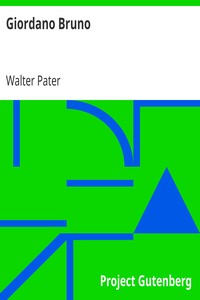| Summary |
"Giordano Bruno" by Walter Pater is a philosophical work that explores the life and ideas of the Italian thinker Giordano Bruno, which falls under the category of biography and philosophical narrative. Written during the late 19th century, particularly in the Victorian era, the book delves into Bruno's radical thoughts on metaphysics, pantheism, and the nature of the universe. Pater emphasizes Bruno’s quest for intellectual freedom and his belief in the interconnectedness of all things as a manifestation of the divine in nature. The book provides an in-depth analysis of Bruno’s philosophy, presenting him as a figure deeply influenced by his monastic upbringing, yet yearning for a broader understanding of existence that goes beyond the dogmatic constraints of his time. Pater portrays Bruno as a passionate seeker of knowledge, whose engagement with ancient philosophical texts, such as those of Plotinus and Plato, led him to develop a unique worldview that embraced pantheism and the notion of the divine spirit pervading all elements of nature. Throughout the narrative, Pater reflects on Bruno's ability to blend philosophy with poetic expression, illustrating how his ideas resonated with the ideals of the Renaissance and challenged the conventional belief systems of his era, ultimately leading to his persecution by the Church. (This is an automatically generated summary.)
|

